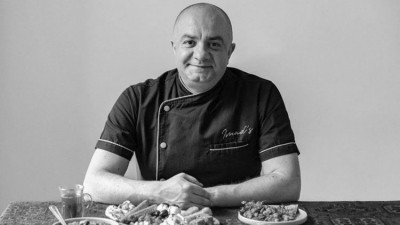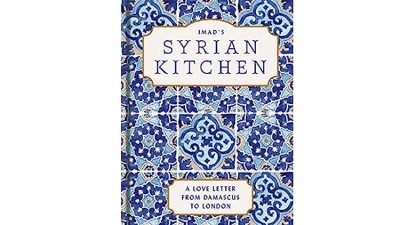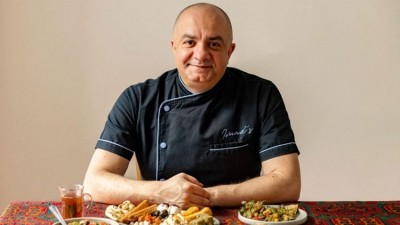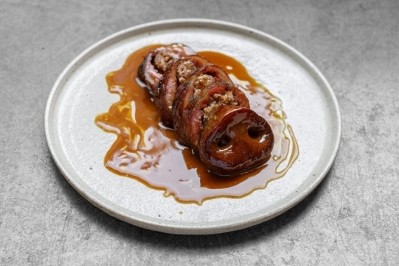A Syrian love story - Imad Alarnab on opening his first London restaurant
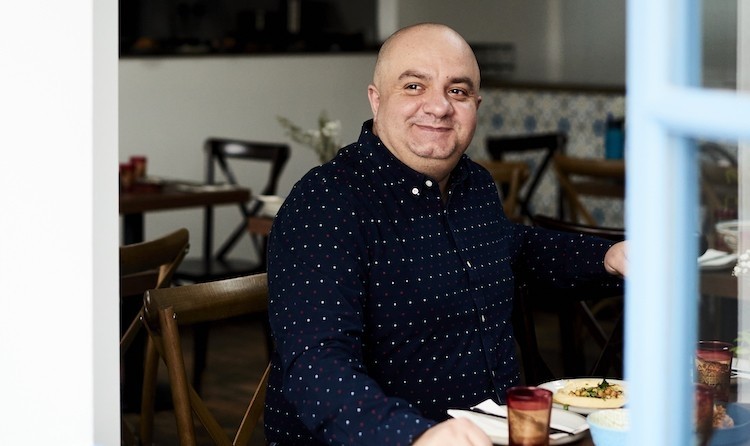
There are many different ways of making falafel, but for Syrian chef Imad Alarnab there was only ever one recipe to use in his own restaurant. “I’ve always described my food as ‘authentic enough’,” says the affable chef. “I like to put my own spin on different dishes, but there’s no way I could try to do that with the falafel. In Syria, the recipe is sacred. And so the way we prepare it in the restaurant is exactly the same as I would at home.”
True to the traditional Syrian method, the falafel at Imad’s Syrian Kitchen, which has finally opened at Kingly Court in London’s Soho after a number of false starts, is made from chickpeas only, which have been seasoned with spices including cumin and coriander, blitzed and mixed with sesame seeds, shaped into flattish circles with a hole in the middle, fried, and topped with a sprinkling of sumac. When presented on the plate, on a small bed of tahini and with a salad garnish, they have the appearance of small, savoury doughnuts: crispy, zesty, chewy – and so very moreish.
The opening of Alarnab’s first London restaurant is a watershed moment, not just for the chef – who was forced to flee his home city of Damascus, where he owned a group of restaurants and cafés, in 2015 as a result of the ongoing Syrian civil war – but also the city. Despite a burgeoning Middle Eastern restaurant scene, Syrian cuisine has largely remained unexplored in the capital. Indeed, Imad’s could arguably be described as London’s first high-profile Syrian restaurant.
Alarnab’s menu is confidently tight, featuring between 13 and 15 small sharing plates. Some – including the hummus topped with whole chickpeas and sumac; and baba ghanoj, served in the skin of half a roasted aubergine, topped with both pomegranate seeds and molasses, and drizzled with tahini – will be familiar, others less so.
“I describe Syrian food as the ‘better’ version of Mediterranean cuisine,” chuckles Alarnab. “With the menu I’m trying to create something that’s familiar, but still surprising. About half of the dishes are very traditional, while the others are my own recipes that are all inspired by the Syrian cuisine.”
‘Signature’ dishes that diners may be less accustomed to include jaj barghol, succulent grilled chicken thighs served on a bed of bulgur wheat that’s been fragrantly spiced with cardamom, cinnamon, cloves and cumin; fattet macdous, baby aubergine stuffed with mince lamb, topped with tahini and cumin seeds, and served with crispy squares of flatbread; and a smooth, subtle dessert of Syrian ice cream that’s made with pistachios, naturally sweetened with Mastiha, and topped with lacy white strands of candy floss that’s lightyears away from the pink clouds of sugar you’ll find at your local fairground.
“There isn’t really any complexity to Syrian cooking,” muses Alarnab as he discusses the menu. “It’s about learning how to use your spices to find a balance in the flavours, and that is what our menu is built on. It’s simple food, made with love.”
Prices range from £5.50 for the smaller plates to £15 for the bigger, meatier options, and Alarnab is aiming for a spend per head of around £35. “I want my food to be affordable to as many as possible,” he adds. “Syrian cuisine is not famous enough, but hopefully through my restaurant it will be one day.”
Opening in London
Alarnab dreamed of being able to open his own restaurant in central London but didn’t realistically expect it to become a reality. “I’ve been wanting to have my own site since 2017,” he says. “I tried to find somewhere central, but anywhere I saw that I liked was always beyond my budget.”
Then, last year, the pandemic hit, and with it came a change of fortune. “Because of Covid, the competition for sites wasn’t as aggressive and it gave me the opportunity not only to finally get my own restaurant, but also have one in the centre of the city. It was a scary time, and like every restaurateur, I was nervous. But I knew this was my chance, and I had to take it.”
The site, on the top floor of Kingly Court, was previously occupied by Asma Khan’s Darjeeling Express, which moved to a much larger space in Covent Garden last year having similarly managed to secure a favourable rent deal as a result of the pandemic’s impact on the commercial property market. There’s a poetic symmetry to Alarnab inheriting the lease. Like Khan was when she opened Darjeeling Express in 2017, Alarnab is an outsider to the London restaurant scene who’s determined to make his mark.
"I knew this was my chance, and I had to take it”
After two none starts – the restaurant was scheduled to open first in November and then December last year, but both times the launch was pushed back as a result of lockdown restrictions – Alarnab admits to being relieved at finally getting the doors open. We meet prior to what’s set to be a busy evening service. Every table is booked. The kitchen is abuzz as the chefs make final menu preparations; while on the restaurant floor, the front of house team puts the finishing touches to the tables.
Just as Khan did when it was Darjeeling Express, Alarnab wants the restaurant to be seen as an extension of his home. It certainly has that warm, inviting feel. At one instance, while we’re talking, his wife and children briefly pop in, all smiles, to see how everything is going before opening.
The restaurant’s visual design is bright and airy, akin in its breeziness to a beachfront taverna. High ceilings, wooden beams and whitewashed walls are complemented by bursts of colour from the Aegean-blue tiles that feature an ornate patterning that, according to the chef, is typically found dotted around households in Damascus.
As well as overseeing the kitchen, Alarnab regularly spends time on the floor during the service, either explaining the dishes and just generally mingling with the guests. “I love to be in the kitchen, but I also want to be out the front with the customers,” he says with an infectious zeal. “People ask me which one I prefer, but it’s an impossible choice; I need to be in both.”
A perilous journey
Dotted around the walls of Imad’s Syrian Kitchen are a series of photos recalling moments, places and events that brought Alarnab to where he is today. They include the hand of the door knocker on his parent’s house in Damascus; pictures from various pop ups the chef has held in London; birthday celebrations with friends and family; and, in one instance, time spent in the Calais migrant camp prior to his arrival in the UK.
“It’s all part of my journey,” says Alarnab. “I want to share my story with my guests. There are so many amazing people I have met that I wanted to include in the pictures; it was hard to decide which ones to include.”
Alarnab opened his first restaurant in Damascus in 1999. His natural path, he says, was to enter the textile and fashion design industry, but the call of the kitchen was ultimately too great.
“It was always my dream to have my own place. I’ve always loved cooking. It gives me comfort and safety.”
Between 1999 and 2011, Alarnab built a considerable empire in Damascus. As well as two further restaurants, he opened a group of juice bars and had four coffee shops. By his own admission, it was a comfortable life. But then the war started.
“We lost it all over six days in March 2012. All the businesses were destroyed in bombings, along with two houses and two cars. It was devastating, but I wasn’t sad. My family were safe, and we were able to move from place to place for a while. Eventually, though, it became too much. I couldn’t take it anymore, and finally left in July 2015.”
"I didn’t have any other choice; I needed to keep going”
Having managed to escape Damascus, Alarnab managed to briefly rendezvous with his family in Beirut, before taking the perilous journey to Europe alone. Smuggled in a lorry, he went from Lebanon to Turkey, and then eventually on to Greece, Macedonia, Serbia, Hungry, Austria, Germany, and France. It wasn’t until October that he finally reached the UK.
While some memories remain vivid, much of the journey is now a blur. “Emotionally, I wasn’t prepared for it. I’m not a tough, adventure guy, and there were moments when it was really scary. But I knew I didn’t have any other choice; I needed to keep going.”
It was always Alarnab’s aim to make it to England. “I wanted somewhere where I could work as I had something to give back,” he says. It helped that his mother, who studied English at university, had taught him the language growing up. “She taught me how to cook and how to speak English, and here I am,” he adds, with a smile.
Settling in England
Arriving in England with barely any money, Alarnab initially worked as a car washer to get by. Later he progressed to car salesman. “I actually hate cars,” he says, wryly. “But I was good at the job and grateful for work. But all the time my mind was thinking about getting back into restaurants.”
The opportunity eventually came in March 2017, when he partnered with humanitarian aid charity Choose Love to launch a pop up on Columbia Road in Bethnal Green. Being back in the kitchen was a joy for the chef, but it wasn’t without its challenges. “I thought it would be straightforward. I had a plan to serve some proper Syrian dishes that people would never have encountered before. But it just wasn’t the right place to do that.”
He almost shudders as he recounts the decision to feature kibbeh labanieh on the menu. The dish, which is a popular Middle Eastern recipe, is traditionally made by pounding bulgur wheat together with ground beef into a fine paste and forming it into balls with toasted pine nuts and spices (the kibbeh). This is then cooked in a thick sauce of garlic and yoghurt (the labanieh), and often served alongside rice.
“It wasn’t popular,” he says with comical litotes. “Me and my family ended up living off kibbeh labanieh for about six weeks after that pop up, and I vowed to never cook it again. From that pop up, though, I realised that I needed a deeper understanding of what would work in London. It showed me that if I wanted to have my own permanent place, I needed to take my time.”
The kibbeh labanieh may not have been a hit, but the pop up was. Alarnab followed it with more events, including supper clubs that often sold out within hours of tickets going on sale. Throughout he has continued to work with Choose Love, and to date has raised more than £200,000 for the charity.
Finding karma
Given how long it’s taken to finally get the doors of his own place open, thoughts of expansion are far from Alarnab’s mind. That said, he believes there could be scope to build a falafel bar business, one with a takeaway focus, further down the line. He also has plans to eventually develop a catering arm, which can do larger events including weddings and festivals.
“For now, ultimately, the focus is on Imad’s being its own restaurant. I had an estate before and it worked for me at the time, but now my goal has changed. I want to be able to enjoy my business for what it is a bit more before I think about growing it.”
Next to the restaurant, one thing that will remain a prominent focus is the partnership with Choose Love. The chef donates £1 from every bill to Choose Love, and also plans to host a weekly supper club where £15 from every booking will go to the charity.
One thing he is keen to make clear is that money will be coming from the restaurant, not the customer. “We don’t add the donation on,” he explains. “We take it from the final bill. My hope is that we will become an example for other businesses.
“I believe in karma. When I first arrived in London, I couldn’t afford to dine anywhere. All the money I had I spent on a train ticket to my sister’s house in Doncaster. Five years later, I have the business I always dreamed of, and that’s thanks to the help of charities like Choose Love.
“I had my second chance, and I’m really grateful for that. I hope that with this, I can help give others their own second chance.”

![ImadsKitchen_Food_010[1]](/var/wrbm_gb_hospitality/storage/images/media/images/imadskitchen_food_010-1/4460830-1-eng-GB/ImadsKitchen_Food_010-1.jpg)
![Imad'sKitchen_Interiors_102[1]](/var/wrbm_gb_hospitality/storage/images/media/images/imad-skitchen_interiors_102-1/4460848-1-eng-GB/Imad-sKitchen_Interiors_102-1.jpg)
![Imad_Portraits_077[1]](/var/wrbm_gb_hospitality/storage/images/media/images/imad_portraits_077-1/4460865-1-eng-GB/Imad_Portraits_077-1.jpg)
